2018年湖南省普通高中学业水平考试英语试卷
2018年湖南高中学业水平考试英语试题及答案
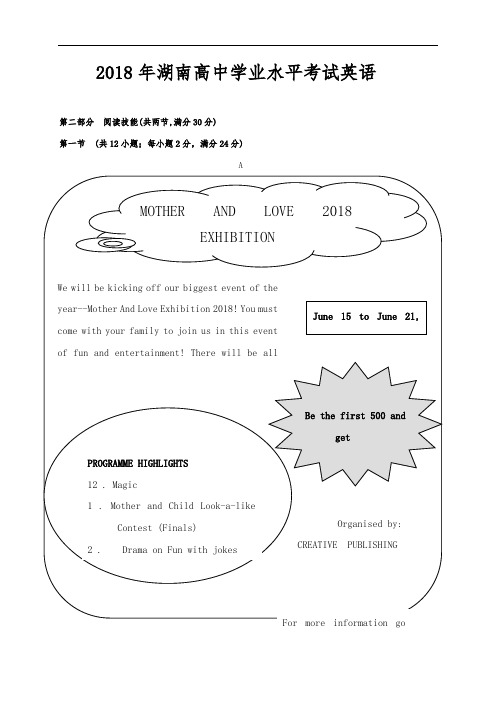
2018年湖南高中学业水平考试英语第二部分阅读技能(共两节,满分30分)第一节 (共12小题;每小题2分,满分24分)A21. How long will the exhibition lastA. Five days.B. Seven days.C. Nine days.D. Eleven days.22. What will you get for free every day if you’re among the first 500A. A magazine.B. A ticket for a magic show.C. A great bargain.D. A chance to join in games.23. If you come with your family at 3 ., you’ll enjoy the programme________.A. Games and Quizzes.B. Lucky DrawC. Drama on Fun with jokesD. Story Telling24. For more information about the exhibition, you can_______.A. call the organizerB. write to the companyC. visit the websiteD. e-mail the publisherBChen Zijiang is a paper-cutting expert whom I interviewed for my article on Chinese Art. Paper-cutting is something that he learned to do from an early age.“It is a Chinese folk art with a long history,” Mr. Chen told me, “Paper cuts of animals have been found in tombs which date back to the time of the Northern and Southern Dynasty!” He added that by the Southern Song Dynasty, paper-cutting had become an important part of everyday life.Mr. Chen went on to explain that there are three types of paper cuts which people still make today: paper cuts for decoration, for religious purposes and for design patterns.Paper cuts used for decoration are often seen on windows and gates. They are often put up during holidays to bring good luck. They are also used on presents. For example, a present for parents whose child has recently been born might showa paper cut of children. Paper cuts which show the Chinese character for double happiness are often used to celebrate weddings.Paper cuts used for religious purposes are often found in temples. They are also used asofferings(祭品) to the dead. People to whom the dead person was related would make theseofferings on special days and during festivalsPaper cuts of the third kind are those used to make patterns on clothing. They are alsosometimes used to decorate jewellery boxes. Dragons are very popular patterns for these designs.The interview is very useful as I’ve got a lot of interesting information for my article. I am also ready to try out paper-cutting for myself.25. How many kinds of paper cuts did Mr. Chen talk aboutA. One.B. Two.C. Three.D. Four.26. According to Paragraph 4, paper cuts for decoration are used to______.A. bring good luckB. please guestsC. honor the deadD. make patterns on clothing27. What patterns can be often seen on jewellery boxes according to the passageA. Dragons.B. Pandas.C. Birds.D. Double happiness28. How does the writer feel about the interviewA. It’s boring.B. I t’s satis fying.C. It’s challenging.D. It’s disappointingCMrs. Timms listened as the radio announcer gave a hurricane (飓风) warning for her town. Then she woke up her sons, Eddie and Jasper, and quickly explained,"We’ve got a lot to do, boys. There is no school today, and my office is closed. The hurricane is coming!Just then, the boys grandfather arrived from his seaside home. Grandpa explained that the local government had told people to evacuate their homes by the sea. It just wasn’t safe for anyone to stay near the ocean during the hurricaneSoon afterwards, Mrs. Timms left to buy supplies that the family would need during the storm. Batteries, bottled water and canned food were a few of the items on her list.Grandpa stayed with the boys, and the three of them made preparations for the storm. First, they filled the bathtub and all the empty water bottles they could find. Next, they unplugged(拔掉插头)almost everything in the house. Then, Eddie helped Grandpa strengthen the windows. Meanwhile, Jasper put the outdoor chairs inside.Later, as the storm approached, the family stayed in protected areas away from the windows and outside walls. Mrs. Timms and Grandpa moved chairs to a protected space near the staircase. Eddie and Jasper sat under a strong table next to them, reading and playing games. They waited for the radio announcer to declare that the hurricane had passed.did Mrs. Timms do after hearing the hurricane warningA. She went to work.B. She woke up her sons.C. She prepared breakfast.D. She watched the hurricane.30. The underlined word “evacuate” in Paragraph 2 means______.A. lockB. reachC. repairD. leave31. While Eddie helped Grandpa strengthen the windows, Jasper_______.A. filled the bathtubB. turned off the lightsC. put the outdoor chairs insideD. sat under a strong table32. What could be the best title for the textA. A Happy Family.B. A Seaside House.C. The Damage of the Hurricane.D. The Day of the Hurricane.第二节 (共3小题;每小题2分,满分6分)Ways to Improve Social SkillsIf you feel like you're not good at social events or you struggle to enter into conversations because you're shy, it can influence your social life and you career(事业). However, you can start improve your social skills by following these ways and soon, you'll be able to enter into conversations with confidence.Behave Like a Social PersonYou can behave like a more social creature, even if you don't feel like it. Don't allow anxiety to hold you back. Make the decision to talk to new people and to enter into conversations even when you’re feeling nervous about it. Over time, it will get easier and you'll quickly start improving your social skills.If going to a party or spending time in a crowd seems confusing, start small. Go to a restaurant and order your food, an d say “Thank you” to the clerk. Practice making small talks gradually.Encourage Others to Talk About ThemselvesMost people really enjoy talking about themselves. Ask a question about a person’s career, hobbies, or family. Show you’re interested in hearin g what is being said.Good manners go a long way in improving social skills. Practice being polite,showing gratitude(感恩), and using good table manners..Your body language is very important in conversations, Pay attention to the type of bodylanguage you use. Try to appear relaxed, make appropriate amounts of eye contact, and appear open to conversations.A. Practice Good MannersB. Start Small if NecessaryC. Join a Social Skills Support GroupD. Pay Attention to your Body Language第三部分知识运用(共三节,满分25分)第一节完形填空(共10小题;每小题1分,满分10分)Mary, an 1l-year-old girl, became famous all over the world by accident. One day. Mary was showing her friend, Tom, how to use a camera. Then, Tom took a photo of Mary standing under an interesting___36______. Nothing happened until they got the photo developed. When they looked at the photo. they saw____37____ hanging down from the tree. At first, they thought it was a snake. Then they___38____ it was a leopard’s(猎豹)tail. Mary ____39____to go back to the tree to see if the leopard was ____40____ there. She wanted to get a nicer photo of her and the leopard. She and Tom went in the middle of the day, and found the leopard was still there___41____. So they managed to get a good photo of Mary and the sleeping leopard together.They showed the amazing picture to Mary's father, who owned the local newspaper. He put it in the Sunday paper. ___42____people saw the photo, they wrote letters to the___43____ asking to see more, so Mary started to take morephotos with many more wild animals. Soon a lot of magazines started to__44____ the photos from her. Mary and her___45___donated a lot of the money from their photos to a charity group called Save the Children.36. A. tree B. home C. picture D. bridge37. A. everything B. nothing C. any D. something38. A. argued B. realized C. remembered D. imagined39. A. refused B. hesitated C. decided D. agreed40. A. even B. once C. still D. almost41. A. alive B. asleep C. awake D. active42. A. When B. Though C. unless D. Before43. A. zoo B. park C. magazine D. newspaper44. A. buy B. save C. keep D. borrow45. A. teacher B. father C. brother D. neighbor第二节 (共10小题;每小题1分;满分10分)When Coca-Cola was first brought to China in 1928, it was hard for the company___46__ (translate)its name. After___47___(think) and discussing for years, they decided on using the“可口可乐”,__48____ means “tasty and fun”. Today the English name “Coke”is__49____(accept) by 94 percent of the world's population. The big success of Coca-Cola is due___50___the taste of the drink as well as its advertisements. Coca-Cola was___51_____first company to have ads on Chinese TV. In the beginning, its ads were___52____(usual) about American culture. As time goes by, many Chinese pop___53____ (star) have been appearingin Coke's ads. Thanks to___54___(they) help, the sales of the product become __55____(good) than ever.第三节改错(共5小题;每小题1分,满分5分)下列句子中各有一处语言错误,请把错误改正,其他部分不得改动。
2018湖南普通高中学业水平考试英语版[含答案解析]
![2018湖南普通高中学业水平考试英语版[含答案解析]](https://img.taocdn.com/s3/m/47d2087110a6f524ccbf85a4.png)
WORD 资料 .可编辑机密★ 启用前2017 年湖南省普通高中学业水平考试英语本试题卷分听力技能、阅读技能、知识运用、写作技能四个部分,共 7 页。
时量 120 分钟。
满分 100 分。
第一部分听力技能 ( 共两节,满分20 分 )做题时,先将答案标在试卷上。
录音内容结束后,你将有两分钟的时间将试卷上的答案转涂到答题卡上。
第一节( 共 5小题;每小题 1 分,满分5分)听下面 5 段对话。
每段对话后有一个小题,从题中所给的A、B、C 三个选项中选出最佳选项,并标在试卷的相应位置。
听完每段对话后,你都有10 秒钟的时间来回答有关小题和阅读下一小题。
每段对话读两遍。
例: How much is the shirt?A. £ 19.15.B. £ 9.18.C. £9.15.答案是 C。
听下面一段对话,回答第 1 小题。
1. What will the woman do this weekend?A. Go camping.B. Go swimming.C. Go fishing.听下面一段对话,回答第 2 小题。
2.W hat time did the woman get up?A. At 7:00.B. At 7:20.C. At 7:40.听下面一段对话,回答第 3 小题。
3.W hat is the weather like today?A. Sunny.B. Cloudy.C. Rainy.听下面一段对话,回答第 4 小题。
4. Why does the man look tired?A. He stayed up late.B. He didn ’ t sleep well.C. He worked too long.听下面一段对话,回答第 5 小题。
5. Where are the speakers now?A. In a bookshop.B. In a sports shop.C. In a coffee shop.第二节 ( 共 15 小题;每小题 1 分,满分 15 分)听下面 5 段对话或独白。
2018年湖南高中学业水平考试英语试题及答案
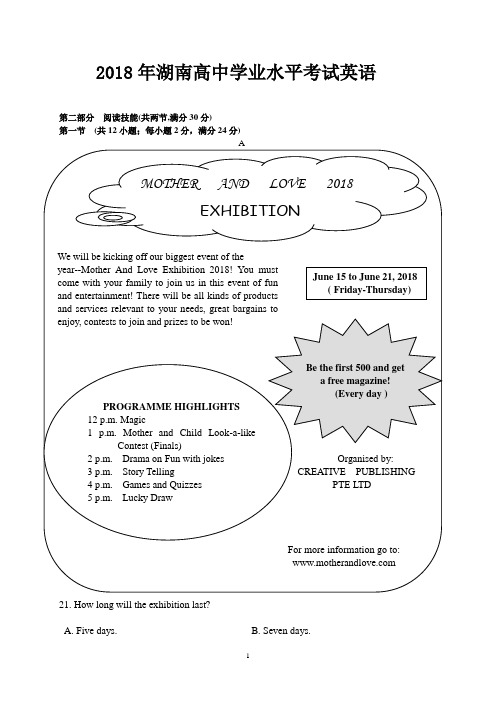
2018年湖南高中学业水平考试英语第二部分阅读技能(共两节,满分30分)第一节(共12小题;每小题2分,满分24分)21. How long will the exhibition last?A. Five days.B. Seven days.C. Nine days.D. Eleven days.22. What will you get for free every day if you’re among the first 500?A. A magazine.B. A ticket for a magic show.C. A great bargain.D. A chance to join in games.23. If you come with your family at 3 p.m., you’ll enjoy the programme________.A. Games and Quizzes.B. Lucky DrawC. Drama on Fun with jokesD. Story Telling24. For more information about the exhibition, you can_______.A. call the organizerB. write to the companyC. visit the websiteD. e-mail the publisherBChen Zijiang is a paper-cutting expert whom I interviewed for my article on Chinese Art. Paper-cutting is something that he learned to do from an early age.“It is a Chinese folk art with a long history,” Mr. Chen told me, “Paper cuts of animals have been found in tombs which date back to the time of the Northern and Southern Dynasty!”He added that by the Southern Song Dynasty, paper-cutting had become an important part of everyday life.Mr. Chen went on to explain that there are three types of paper cuts which people still make today: paper cuts for decoration, for religious purposes and for design patterns.Paper cuts used for decoration are often seen on windows and gates. They are often put up during holidays to bring good luck. They are also used on presents. For example, a present for parents whose child has recently been born might show a paper cut of children. Paper cutswhich show the Chinese character for double happiness are often used to celebrate weddings.Paper cuts used for religious purposes are often found in temples. They are also used as offerings(祭品) to the dead. People to whom the dead person was related would make these offerings on special days and during festivalsPaper cuts of the third kind are those used to make patterns on clothing. They are also sometimes used to decorate jewellery boxes. Dragons are very popular patterns for these designs.The interview is very useful as I’ve got a lot of interesting information for my article. I am also ready to try out paper-cutting for myself.25. How many kinds of paper cuts did Mr. Chen talk about?A. One.B. Two.C. Three.D. Four.26. According to Paragraph 4, paper cuts for decoration are used to______.A. bring good luckB. please guestsC. honor the deadD. make patterns on clothing27. What patterns can be often seen on jewellery boxes according to the passage?A. Dragons.B. Pandas.C. Birds.D. Double happiness28. How does the writer feel about the interview?A. It’s boring.B. I t’s satis fying.C. It’s challenging.D. It’s disappointingCMrs. Timms listened as the radio announcer gave a hurricane (飓风) warning for her town.Then she woke up her sons, Eddie and Jasper, and quickly explained, "We’ve got a lot to do, boys. There is no school today, and my office is closed. The hurricane is coming!Just then, the boys grandfather arrived from his seaside home. Grandpa explained that the local government had told people to evacuate their homes by the sea. It just wasn’t safe for anyone to stay near the ocean during the hurricaneSoon afterwards, Mrs. Timms left to buy supplies that the family would need during the storm. Batteries, bottled water and canned food were a few of the items on her list.Grandpa stayed with the boys, and the three of them made preparations for the storm. First, they filled the bathtub and all the empty water bottles they could find. Next, they unplugged(拔掉插头)almost everything in the house. Then, Eddie helped Grandpa strengthen the windows. Meanwhile, Jasper put the outdoor chairs inside.Later, as the storm approached, the family stayed in protected areas away from the windows and outside walls. Mrs. Timms and Grandpa moved chairs to a protected space near the staircase. Eddie and Jasper sat under a strong table next to them, reading and playing games. They waited for the radio announcer to declare that the hurricane had passed.29.What did Mrs. Timms do after hearing the hurricane warning?A. She went to work.B. She woke up her sons.C. She prepared breakfast.D. She watched the hurricane.30. The underlined word “evacuate” in Paragraph 2 means______.A. lockB. reachC. repairD. leave31. While Eddie helped Grandpa strengthen the windows, Jasper_______.A. filled the bathtubB. turned off the lightsC. put the outdoor chairs insideD. sat under a strong table32. What could be the best title for the text?A. A Happy Family.B. A Seaside House.C. The Damage of the Hurricane.D. The Day of the Hurricane.第二节(共3小题;每小题2分,满分6分)Ways to Improve Social SkillsIf you feel like you're not good at social events or you struggle to enter into conversations because you're shy, it can influence your social life and you career(事业). However, you can start improve your social skills by following these ways and soon, you'll be able to enter into conversations with confidence.Behave Like a Social PersonYou can behave like a more social creature, even if you don't feel like it. Don't allow anxiety to hold you back. Make the decision to talk to new people and to enter into conversations even when you’re feeling nervous about it. Over time, it will get easier and you'll quickly start improving your social skills.33._________________________If going to a party or spending time in a crowd seems confusing, start small. Go to a restaurant and order your food, and say “Thank you” to the clerk. Practice making small talks gradually.Encourage Others to Talk About ThemselvesMost people really enjoy talking about themselves. Ask a question about a person’s career, hobbies, or family. Show you’re interested in hearing what is being said.34._________________________Good manners go a long way in improving social skills. Practice being polite, showing gratitude(感恩), and using good table manners.35._________________________.Your body language is very important in conversations, Pay attention to the type of body language you use. Try to appear relaxed, make appropriate amounts of eye contact, and appear open to conversations.A. Practice Good MannersB. Start Small if NecessaryC. Join a Social Skills Support GroupD. Pay Attention to your Body Language第三部分知识运用(共三节,满分25分)第一节完形填空(共10小题;每小题1分,满分10分)Mary, an 1l-year-old girl, became famous all over the world by accident. One day. Mary was showing her friend, Tom, how to use a camera. Then, Tom took a photo of Mary standing under an interesting___36______. Nothing happened until they got the photo developed. When they looked at the photo. they saw____37____ hanging down from the tree. At first, they thought it was a snake. Then they___38____ it was a leopard’s(猎豹)tail. Mary ____39____to go back to the tree to see if the leopard was ____40____ there. She wanted toget a nicer photo of her and the leopard. She and Tom went in the middle of the day, and found the leopard was still there___41____. So they managed to get a good photo of Mary and the sleeping leopard together.They showed the amazing picture to Mary's father, who owned the local newspaper. He put it in the Sunday paper. ___42____people saw the photo, they wrote letters to the___43____ asking to see more, so Mary started to take more photos with many more wild animals. Soon a lot of magazines started to__44____ the photos from her. Mary and her___45___donated a lot of the money from their photos to a charity group called Save the Children.36. A. tree B. home C. picture D. bridge37. A. everything B. nothing C. any D. something38. A. argued B. realized C. remembered D. imagined39. A. refused B. hesitated C. decided D. agreed40. A. even B. once C. still D. almost41. A. alive B. asleep C. awake D. active42. A. When B. Though C. unless D. Before43. A. zoo B. park C. magazine D. newspaper44. A. buy B. save C. keep D. borrow45. A. teacher B. father C. brother D. neighbor第二节(共10小题;每小题1分;满分10分)When Coca-Cola was first brought to China in 1928, it was hard for the company___46__ (translate)its name. After___47___(think) and discussing for years, they decided on using the “可口可乐”,__48____ means “tasty and fun”. Today the English name “Coke”is__49____(accept) by 94 percent of the world's population. The big success of Coca-Cola is due___50___the taste of the drink as well as its advertisements. Coca-Cola was___51_____first company to have ads on Chinese TV. In the beginning, its ads were___52____(usual) about American culture. As time goes by, many Chinese pop___53____ (star) have been appearing in Coke's ads. Thanks to___54___(they) help, the sales of the product become __55____(good) than ever.第三节改错(共5小题;每小题1分,满分5分)下列句子中各有一处语言错误,请把错误改正,其他部分不得改动。
2018年湖南省普通高等学校招生统一考试英语试卷(A版)

2018年普通高等学校全国统一招生考试(湖南卷)英语试卷一、听力理解 ( 本大题共 1 题, 共计 30 分)第一节听下面5段对话。
每段对话后有一个小题,从题中所给的A、B、C三个选项中选出最佳选项,并标在试题卷的相应位置。
听完每段对话后,你都有10秒钟的时间来回答有关小题和阅读下一小题。
每段对话仅读一遍。
例:How much is the shirt?A. £19. 15.B.£9. 15.C. £9. 18. 答案是B1. Where will the man go for holiday?A. France.B. Egypt.C. Austria.2. Why did the man make the phone call?A. His luggage was lost.B. His plane was late.C. His office was locked.3. How much is a two-term course?A. $50B. $90C. $1204. What does the man mean?A. He will not cook dinner.B. He isn’t good at cooking fish.C. He prefers not to cook the fish.5. When will the man probably get to London?A. At 8 o’clock.B. At 9 o’clock.C.At 10 o’clock.第二节听下面4段对话。
每段对话后有几个小题,从题中所给的A、B、C三个选项中选出最佳选项。
并标在试题卷的相应位置。
听每段对话前,你将有时间阅读各个小题,每小题5秒钟;听完后,各小题将给出5秒钟的作答时间。
每段对话读两遍。
听下面一段对话,回答第6和第7两个小题。
6. What can we learn from the dialogue?A. The woman was badly hurt.B. The car was terribly damaged.C. The kids were seriously injured.7. What was the woman thinking about?A. Getting the car repaired.B. Selling the damaged car.C. Buying a second-hand car.听下面一段对话,回答第8至第10三个小题。
2018高考试的题目——英语湖南卷解析汇报汇报版
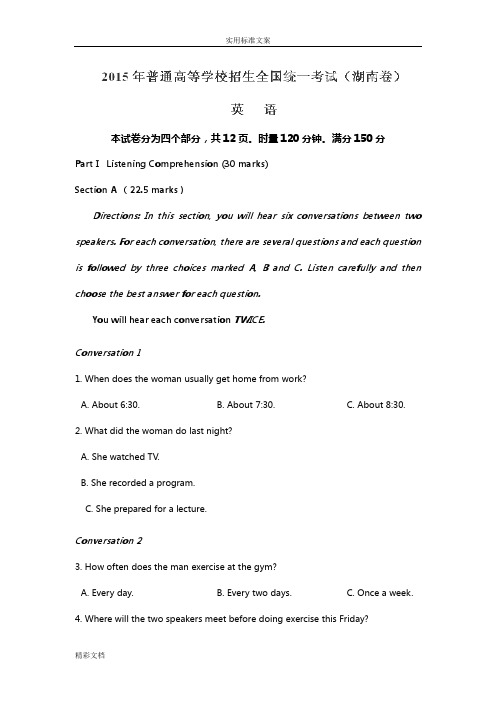
本试卷分为四个部分,共12页。
时量120分钟。
满分150分PartⅠListening Comprehension (30 marks)Section A (22.5 marks)Directions: In this section, you will hear six conversations between two speakers. For each conversation, there are several questions and each question is followed by three choices marked A, B and C. Listen carefully and then choose the best answer for each question.You will hear each conversation TWICE.Conversation 11. When does the woman usually get home from work?A. About 6:30.B. About 7:30.C. About 8:30.2. What did the woman do last night?A. She watched TV.B. She recorded a program.C. She prepared for a lecture.Conversation 23. How often does the man exercise at the gym?A. Every day.B. Every two days.C. Once a week.4. Where will the two speakers meet before doing exercise this Friday?A. At the park.B. At the cafe.C. At the cinema. Conversation 35. What is Mr. Chester doing?A. T elephoning someone.B. Speaking to the woman.C. Leaving the man a message.6. What is the man's last name?A. Oliver.B. Horst.C. Robert. Conversation 47. Why will the woman be late?A. She didn't catch the train.B. She didn't finish her paper.C. She didn't wake up in time.8. Where is the man?A. At the station.B. At home.C. At the office.9. What is the probable relationship between the two speakers?A. T eacher and student.B. Parent and child.C. Husband and wife.Conversation 510. For whom does the woman buy the T-shirt?A. Herself.B. Her husband.C. Her friend.11 .How much does the T-shirt normally cost?A. $54.B. $60.C. $70.12. Why does the salesman agree to sell the T-shirt at $48?A. It is cheaper online.B. He is in a hurry.C. A button is lost.Conversation 613. When did the woman arrive?A. Friday.B. Saturday.C. Sunday.14. What major did the man choose in the end?A. English.B. Biology. C . History.15. What suggestion does the man give on reading the books?A. Making notes.B. Skimming first.C. Reading word by word.Section B(7.5 marks)Directions: In this section, you will hear a short passage. Listen carefully and then fill in the numbered blanks with the information you have heard. Fill in each blank with NO MORE THAN THREE WORDS.You will hear the short passage TWICEPart ⅡLanguage Knowledge (45 marks)Section A (15 marks)Directions: For each of the following unfinished sentences there are four choices marked A, B, C and D. Choose the one that best completes the sentence.21.It was when we were returning home ________ I realized what a good feeling it was to have helped someone in trouble.A. whichB. thatC. whereD. how 【答案】B考点:考查强调句。
18年年英语真题及解析_2018年湖南省高考英语试卷
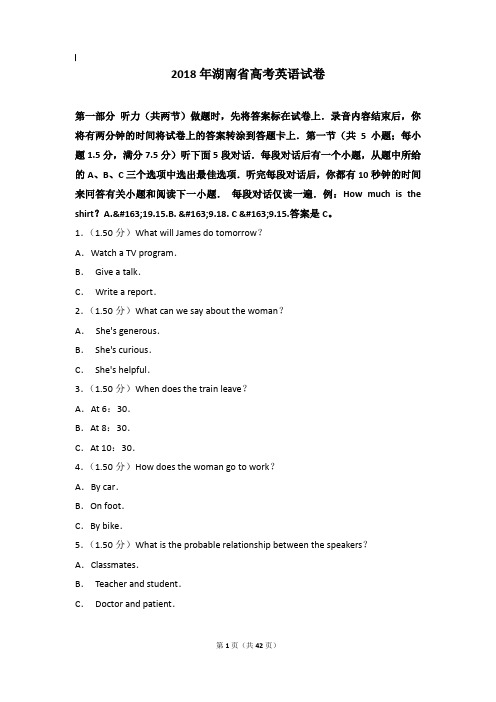
2018年湖南省高考英语试卷第一部分听力(共两节)做题时,先将答案标在试卷上.录音内容结束后,你将有两分钟的时间将试卷上的答案转涂到答题卡上.第一节(共5小题;每小题1.5分,满分7.5分)听下面5段对话.每段对话后有一个小题,从题中所给的A、B、C三个选项中选出最佳选项.听完每段对话后,你都有10秒钟的时间来冋答有关小题和阅读下一小题.每段对话仅读一遍.例:How much is the shirt?A.£19.15.B. £9.18. C £9.15.答案是C。
1.(1.50分)What will James do tomorrow?A.Watch a TV program.B.Give a talk.C.Write a report.2.(1.50分)What can we say about the woman?A.She's generous.B.She's curious.C.She's helpful.3.(1.50分)When does the train leave?A.At 6:30.B.At 8:30.C.At 10:30.4.(1.50分)How does the woman go to work?A.By car.B.On foot.C.By bike.5.(1.50分)What is the probable relationship between the speakers?A.Classmates.B.Teacher and student.C.Doctor and patient.第二节(每小题1.5分,满分22.5分)听下面5段对话或独白.每段对话或独白后有几个小题,从题中所给的A、B、C、D三个选项中选出最佳选项.听每段对话或独白前,你将有时间阅读各个小题,每小题5秒钟;听完后,各小题将给出5秒钟的作答时间.毎段对话或独白读两遍.6.(3.00分)听第6段材料,回答下列各题.(1)What does the woman regret?A.Giving up her research.B.Dropping out of college.C.Changing her major.(2)What is the woman interested in studying now?A.Ecology.B.Education.C.Chemistry.7.(3.00分)听第7段材料,回答下列各题.(1)What is the man?A.A hotel manager.B.A tour guide.C.A taxi driver.(2)What is the man doing for the woman?A.Looking for some local foods.B.Showing her around the seaside.C.Offering information about a hotel.8.(4.50分)听第8段材料,回答下列各题.(1)Where does the conversation probably take place?A.In an office.B.At home.C.At a restaurant.(2)What will the speakers do tomorrow evening?A.Go to a concert.B.Visit a friend.C.Work extra hours.(3)Who is Alice going to call?A.Mike.B.Joan.C.Catherine.9.(6.00分)听第9段材料,回答下列各题.(1)Why does the woman meet the man?A.To look at an apartment.B.To deliver some furniture.C.To have a meal together.(2)What does the woman like about the carpet?A.Its color.B.Its design.C.Its quality.(3)What does the man say about the kitchen?A.It's a good size.B.It's newly painted.C.It's adequately equipped.(4)What will the woman probably do next?A.Go downtown.B.Talk with her friend.C.Make payment.10.(6.00分)听第10段材料,回答下列各题.(1)Who is the speaker probably talking to?A.Movie fans.B.News reporters.C.College students.(2)When did the speaker take English classes?A.Before he left his hometown.B.After he came to America.C.When he was 15 years old.(3)How does the speaker feel about his teacher?A.He's proud.B.He's sympathetic.C.He's grateful.(4)What does the speaker mainly talk about?A.How education shaped his life.B.How his language skills improved.C.How he managed his business well.第二部分阅读理解(共两节)第一节(满分30分)阅读下列短文,从每题所给的A、B、C和D四个选项中,选出最佳选项.11.(6.00分)AWashington,D.C.Bicycle ToursCherry Blossom Bike Tour in Washington,D.C.Duration:3 hoursThis small group bike tour is a fantastic way to see the world﹣famous cherry trees with beautiful flowers of Washington,D.C.Your guide will provide a history lesson about the trees and the famous monuments where they blossom.Reserve your spot before availability ﹣and the cherry blossoms ﹣disappear! Washington Capital Monuments Bicycle TourDuration:3 hours (4 miles)Join a guided bike tour and view some of the most popular monuments in Washington,D.C.Explore the monuments and memorials on the National Mall as your guide shares unique facts and history at each stop.Guided tour includes bike,helmet,cookies and bottled water.Capital City Bike Tour in Washington,D.C.Duration:3 hoursMorning or Afternoon,this bike tour is the perfect tour for D.C.newcomers and locals looking to experience Washington,D.C.in a healthy way with minimum effort.Knowledgeable guides will entertain you with the most interesting stories about Presidents,Congress,memorials,and parks.Comfortable bikes and a smooth tour route(路线)make cycling between the sites fun and relaxing.Washington Capital Sites at Night Bicycle TourDuration:3 hours (7 miles)Join a small group bike tour for an evening of exploration in the heart of Washington,D C.Get up close to the monuments and memorials as you bike the sites of Capitol Hill and the National Mall.Frequent stops are made for photo taking as your guide offers unique facts and history.Tour includes bike,helmet,and bottled water.All riders are equipped with reflective vests and safety lights.(1)Which tour do you need to book in advance?A.Cherry Blossom Bike Tour in Washington,D.C.B.Washington Capital Monuments Bicycle Tour.C.Capital City Bike Tour in Washington,D.C.D.Washington Capital Sites at Night Bicycle Tour.(2)What will you do on the Capital City Bike Tour?A.Meet famous people.B.Go to a national park.C.Visit well﹣known museums.D.Enjoy interesting stories.(3)Which of the following does the bicycle tour at night provide?A.City maps.B.Cameras.C.Meals.D.Safety lights.12.(8.00分)BGood Morning Britain's Susanna Reid is used to grilling guests on the sofa every morning,but she is cooking up a storm in her latest role ﹣showing families how to prepare delicious and nutritious meals on a tight budget.In Save Money:Good Food,she visits a different home each week and with the help of chef Matt Tebbutt offers top tips on how to reduce food waste,while preparing recipes for under £5 per family a day.And the Good Morning Britain presenter says she's been able to put a lot of what she's learnt into practice in her own home,preparing meals for sons,Sam,14,Finn,13,and Jack,11."We love Mexican churros,so I buy them on my phone from my local Mexican takeaway restaurant,'' she explains,"I pay £5 for a portion(一份),but Matt makes them for 26p a portion,because they are flour,water,sugar and oil.Everybody can buy takeaway food,but sometimes we're not aware how cheaply we can make this food ourselves."The eight﹣part series (系列节目),Save Money:Good Food,follows in the footsteps of ITV's Save Money:Good Health,which gave viewers advice on how to get value from the vast range of health products on the market.With food our biggest weekly household expense.Susanna and Matt spend time with a different family each week.In tonight's Easter special they come to the aid of a family in need of some delicious inspiration on a budget.The team transforms the family's long weekend of celebration with less expensive but still tasty recipes.(1)What do we know about Susanna Reid?A.She enjoys embarrassing her guests.B.She has started a new programme.C.She dislikes working early in the morning.D.She has had a tight budget for her family.(2)How does Matt Tebbutt help Susanna?A.He buys cooking materials for her.B.He prepares food for her kids.C.He assists her in cooking matters.D.He invites guest families for her.(3)What does the author intend to do in paragraph 4?A.Summarize the previous paragraphs.B.Provide some advice for the readers.C.Add some background information.D.Introduce a new topic for discussion.(4)What can be a suitable title for the text?A.Keeping Fit by Eating SmartB.Balancing Our Daily DietC.Making Yourself a Perfect ChefD.Cooking Well for Less13.(8.00分)CLanguages have been coming and going for thousands of years,but in recent times there has been less coming and a lot more going.When the world was still populated by hunter﹣gatherers,small,tightly knit (联系)groups developed their own patterns of speech independent of each other.Some language experts believe that 10,000 years ago,when the world had just five to ten million people,they spoke perhaps 12,000 languages between them.Soon afterwards,many of those people started settling down to become farmers,and their languages too became more settled and fewer in number.In recent centuries,trade,industrialisation,the development of the nation﹣state and the spread of universal compulsory education,especially globalisation andbetter communications in the past few decades,all have caused many languages to disappear,and dominant languages such as English,Spanish and Chinese are increasingly taking over.At present,the world has about 6,800 languages.The distribution of these languages is hugely uneven.The general rule is that mild zones have relatively few languages,often spoken by many people,while hot,wet zones have lots,often spoken by small numbers.Europe has only around 200 languages;the Americas about 1,000;Africa 2,400;and Asia and the Pacific perhaps 3,200,of which Papua New Guinea alone accounts for well over 800.The median number (中位数)of speakers is a mere 6,000,which means that half the world's languages are spoken by fewer people than that.Already well over 400 of the total of 6,800 languages are close to extinction (消亡),with only a few elderly speakers left.Pick,at random,Busuu in Cameroon (eight remaining speakers),Chiapaneco in Mexico (150),Lipan Apache in the United States (two or three)or Wadjigu in Australia (one,with a question﹣mark):none of these seems to have much chance of survival.(1)What can we infer about languages in hunter﹣gatherer times?A.They developed very fast.B.They were large in number.C.They had similar patterns.D.They were closely connected.(2)Which of the following best explains "dominant" underlined in paragraph 2?A.Complex.B.Advanced.C.Powerful.D.Modern.(3)How many languages are spoken by less than 6,000 people at present?A.About 6,800.B.About 3,400.C.About 2,400.D.About 1,200.(4)What is the main idea of the text?A.New languages will be created.B.People's lifestyles are reflected in languages.C.Human development results in fewer languages.D.Geography determines language evolution.14.(8.00分)DWe may think we're a culture that gets rid of our worn technology at the first sight of something shiny and new,but a new study shows that we keep using our old devices (装置)well after they go out of style.That's bad news for the environment ﹣and our wallets ﹣as these outdated devices consume much more energy than the newer ones that do the same things.To figure out how much power these devices are using,Callie Babbitt and her colleagues at the Rochester Institute of Technology in New York tracked the environmental costs for each product throughout its life ﹣from when its minerals are mined to when we stop using the device.This method provided a readout for how home energy use has evolved since the early 1990s.Devices were grouped by generation.Desktop computers,basic mobile phones,and box﹣set TVs defined 1992.Digital cameras arrived on the scene in 1997.And MP3 players,smart phones,and LCD TVs entered homes in 2002,before tablets and e﹣readers showed up in 2007.As we accumulated more devices,however,we didn't throw out our old ones."The living﹣room television is replaced and gets planted in the kids' room,and suddenly one day,you have a TV in every room of the house," said one researcher.The average number of electronic devices rose from four per household in 1992 to 13 in 2007.We're not just keeping these old devices﹣we continue touse them.According to the analysis of Babbitt's team,old desktop monitors and box TVs with cathode ray tubes are the worst devices with their energy consumption and contribution to greenhouse gas emissions (排放)more than doubling during the 1992 to 2007 window.So what's the solution(解决方案)?The team's data only went up to 2007,but the researchers also explored what would happen if consumers replaced old products with new electronics that serve more than one function,such as a tablet for word processing and TV viewing.They found that more on﹣demand entertainment viewing on tablets instead of TVs and desktop computers could cut energy consumption by 44%.(1)What does the author think of new devices?A.They are environment﹣friendly.B.They are no better than the old.C.They cost more to use at home.D.They go out of style quickly.(2)Why did Babbitt's team conduct the research?A.To reduce the cost of minerals.B.To test the life cycle of a product.C.To update consumers on new technology.D.To find out electricity consumption of the devices.(3)Which of the following uses the least energy?A.The box﹣set TV.B.The tablet.C.The LCD TV.D.The desktop computer.(4)What does the text suggest people do about old electronic devices?A.Stop using them.B.Take them apart.C.Upgrade them.D.Recycle them.第二节(毎小题2分,满分10分)根据短文内容,从短文后的选项中选出能填入空白处的最佳选项.选项中有两项为多余选项。
2018年湖南省高中学考英语试题及答案

2018年湖南省高中学考英语试题及答案work Information Technology Company.2020YEAR2018年湖南省普通高中学业水平考试英语本试题卷分听力技能、阅读技能、知识运用、写作技能四个部分,共8页。
时量120分钟,满分100分第一部分听力技能(共两节,满分20分)做题时,先将答案标在试题卷上。
录音内容结束后,你将有两分钟的时间将试题卷上的答案转涂到答题卡上。
第一节 (共5小题;每小题1分,满分5分)听下面5段对话。
每段对话后有一个小题,从题中所给的A、B、C三个选项中选出最佳选项,并标在试题卷的相应位置。
听完每段对话后,你都有10秒钟的时间来回答有关小题和阅读下一小题,每段对话读两遍。
例: How much is the shirt?A.£19.15B. £9.18C. £9.15答案是C。
听下面一段对话,回答第1小题。
I. What did the man eat for dinnerA. PizzasB. Dumplings.C. Noodles听下面一段对话,回答第2小题。
2. Where are the speakers going?A. To the park.B. To the stationC. To the museum.听下面一段对话,回答第3小题。
3. When does the woman go to work?A. At 8: 00.B. At 9: 00.C. At 10:00听下面一段对话,回答第4小题。
4. How often does the man work outA. Once a weekB. Twice a week.C. Three times a week听下面一段对话,回答第5小题。
5. What will the woman do this weekend?A. See a film.B. Do housework.C. Look after her sister.第二节 (共15小题;每小题1分,满分15分)听下面5段对话或独白。
2018年高中学业毕业水平试题英语科(湖南版)
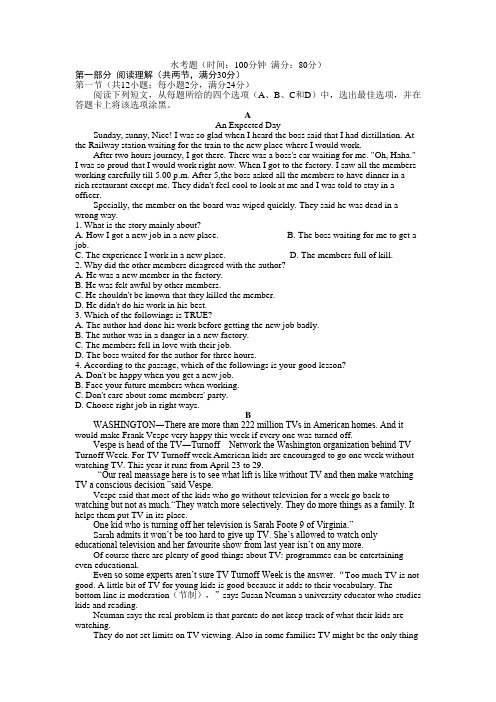
水考题(时间:100分钟满分:80分)第一部分阅读理解(共两节,满分30分)第一节(共12小题;每小题2分,满分24分)阅读下列短文,从每题所给的四个选项(A、B、C和D)中,选出最佳选项,并在答题卡上将该选项涂黑。
AAn Expected DaySunday, sunny, Nice! I was so glad when I heard the boss said that I had distillation. At the Railway station waiting for the train to the new place where I would work.After two hours journey, I got there. There was a boss's car waiting for me. "Oh, Haha."I was so proud that I would work right now. When I got to the factory. I saw all the members working carefully till 5.00 p.m. After 5,the boss asked all the members to have dinner in a rich restaurant except me. They didn't feel cool to look at me and I was told to stay in a officer.Specially, the member on the board was wiped quickly. They said he was dead in a wrong way.1. What is the story mainly about?A. How I got a new job in a new place.B. The boss waiting for me to get a job.C. The experience I work in a new place.D. The members full of kill.2. Why did the other members disagreed with the author?A. He was a new member in the factory.B. He was felt awful by other members.C. He shouldn't be known that they killed the member.D. He didn't do his work in his best.3. Which of the followings is TRUE?A. The author had done his work before getting the new job badly.B. The author was in a danger in a new factory.C. The members fell in love with their job.D. The boss waited for the author for three hours.4. According to the passage, which of the followings is your good lesson?A. Don't be happy when you get a new job.B. Face your future members when working.C. Don't care about some members' party.D. Choose right job in right ways.BWASHINGTON―There are more than 222 million TVs in American homes. And it would make Frank Vespe very happy this week if every one was turned off.Vespe is head of the TV―Turnoff Network the Washington organization behind TV Turnoff Week. For TV Turnoff week American kids are encouraged to go one week without watching TV. This year it runs from April 23 to 29.“Our real meassage here is to see what lift is like without TV and then make watching TV a conscious decision ”said Vespe.Vespe said that most of the kids who go without television for a week go back to watching but not as much.“They watch more selectively. They do more things as a family. It helps them put TV in its place.One kid who is turning off her television is Sarah Foote 9 of Virginia.”Sara h admits it won’t be too hard to give up TV. She’s allowed to watch only educational television and her favourite show from last year isn’t on any more.Of course there are plenty of good things about TV: programmes can be entertaining even educational.Ev en so some experts aren’t sure TV Turnoff Week is the answer.“Too much TV is not good. A little bit of TV for young kids is good because it adds to their vocabulary. The bottom line is moderation(节制),”says Susan Neuman a university educator who studies kids and reading.Neuman says the real problem is that parents do not keep track of what their kids are watching.They do not set limits on TV viewing. Also in some families TV might be the only thingthere is to do.What message does Sarah have for other kids?“It’s a very good idea. I survived a whole week without TV. It also teaches you to enjoy time doing different things and not being sucked into something on TV because you do not want TV taking up all of your time ”Sarah said.5. The purpose of the TV―Turnoff Network is to .A. make children watch TV lessB. make children play outside moreC. make children do more homeworkD. make parents watch more TV programmes6. As Vespe said in this passage turning off TV a week can help children .A. forget to watch TV programmesB. improve their habits of watching TVC. place TV sets out of their bedroomsD. have part-time jobs after school7. In some experts’ opinion .A. parents should turn off TV for their children.B. parents should direct their children how to use TVC. children should enjoy exciting programmes on TVD. children should learn their lessons over TV8. What’s the writer’s purpose in writing this passage?A. To advise us to turn off TV.B. To warn parents of the danger of TV.C. To report to us a piece of news about TV.D. To praise Vespe and his organizationCThe flag, the most common symbol of a nation in the modern world, is also one of the most ancient. With a clear symbolic meaning, the flag in the traditional form is still used today to mark building, ships and other vehicles related to a country.The national flag as we know it today is in no way a primitive artifact. It is , rather, the product of thousands of years’ development. Historians believe that it had two major ancestors, of which the earlier served to show wind direction.Early human beings used very fragile houses and boats. Often strong winds would tearroofs from houses or cause high waves that endangered travelers. People’s food supplies were similarly vulnerable (易受损害的). Even after they had learned how to plant grains, they still needed help from nature to ensure good harvests. Therefore they feared and depended on the power of the wind, which could bring warmth from one direction and cold from another.Using a simple piece of cloth tied to the top of a post to tell the direction of the wind was more dependable than earlier methods, such as watching the rising of smoke from a fire. The connection of the flag with heavenly power was therefore reasonable. Early human societies began to fix long pieces of cloth to the tops of totems (图腾)before carrying them into battle. They believed that the power of the wind would be added to the good wishes of the gods and ancestors represented by the totems themselves.These flags developed very slowly into modern flags. The first known flag of a nation or a ruler was unmarked: The king of China around 1008 B.C. was known to have a white flag carried ahead of him. This practice might have been learned from Egyptians even further in the past, but it was from China that it spread over trade routes through India, then across Arab lands, and finally to Europe, where it met up with the other ancestor of the national flag.9.The best title for the passage would be_A. Uses of FlagsB. Power of the National FlagC. Type of FlagsD. Development of the National Flag10.The earliest flags were connected with heavenly power because_A. they could tell wind directionB. they could bring good luck to fightersC. they were believed to stand for natural forces.D. they were handed down by the ancestors11.What does the author know of the first national flag?A. He knows when it was sent to Europe.B. He believes it was made in Egypt.C. He doubts where it startedD. He thinks it came from China.12. What will the author most probably talk about next?A. The second ancestor of the national flag.B. The role of China in the spread of the national flag.C. The use of modern flags in Europe.D. The importance of modern flags.第二节(共3小题;每小题2分,满分6分)下面文章中有3处(13~15题)需要添加小标题。
2018年湖南省普通高中学业水平考试第三次模拟考试doc
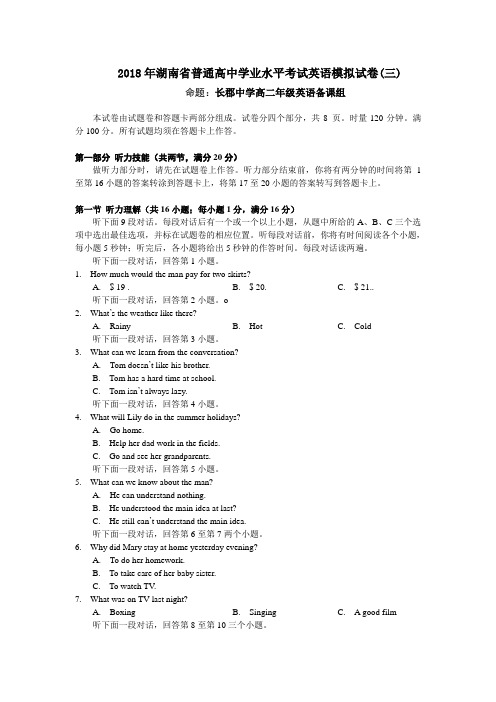
2018年湖南省普通高中学业水平考试英语模拟试卷(三)命题:长郡中学高二年级英语备课组本试卷由试题卷和答题卡两部分组成。
试卷分四个部分,共8 页。
时量120分钟。
满分100分。
所有试题均须在答题卡上作答。
第一部分听力技能(共两节,满分20分)做听力部分时,请先在试题卷上作答。
听力部分结束前,你将有两分钟的时间将第1至第16小题的答案转涂到答题卡上,将第17至20小题的答案转写到答题卡上。
第一节听力理解(共16小题;每小题1分,满分16分)听下面9段对话。
每段对话后有一个或一个以上小题,从题中所给的A、B、C三个选项中选出最佳选项,并标在试题卷的相应位置。
听每段对话前,你将有时间阅读各个小题,每小题5秒钟;听完后,各小题将给出5秒钟的作答时间。
每段对话读两遍。
听下面一段对话,回答第1小题。
1. How much would the man pay for two skirts?A. $ 19 .B. $ 20.C. $ 21..听下面一段对话,回答第2小题。
o2. What’s the weather like there?A. RainyB. HotC. Cold听下面一段对话,回答第3小题。
3. What can we learn from the conversation?A. Tom doesn’t like his brother.B. Tom has a hard time at school.C. Tom isn’t always lazy.听下面一段对话,回答第4小题。
4. What will Lily do in the summer holidays?A. Go home.B. Help her dad work in the fields.C. Go and see her grandparents.听下面一段对话,回答第5小题。
5. What can we know about the man?A. He can understand nothing.B. He understood the main idea at last?C. He still can’t understand the main idea.听下面一段对话,回答第6至第7两个小题。
2018湖南普通高中学业水平考试英语版[含答案解析]
![2018湖南普通高中学业水平考试英语版[含答案解析]](https://img.taocdn.com/s3/m/027f8f2f2cc58bd63086bd04.png)
2018湖南普通高中学业水平考试英语版[含答案解析]编辑整理:尊敬的读者朋友们:这里是精品文档编辑中心,本文档内容是由我和我的同事精心编辑整理后发布的,发布之前我们对文中内容进行仔细校对,但是难免会有疏漏的地方,但是任然希望(2018湖南普通高中学业水平考试英语版[含答案解析])的内容能够给您的工作和学习带来便利。
同时也真诚的希望收到您的建议和反馈,这将是我们进步的源泉,前进的动力。
本文可编辑可修改,如果觉得对您有帮助请收藏以便随时查阅,最后祝您生活愉快业绩进步,以下为2018湖南普通高中学业水平考试英语版[含答案解析]的全部内容。
机密★ 启用前2017年湖南省普通高中学业水平考试英语本试题卷分听力技能、阅读技能、知识运用、写作技能四个部分,共7页。
时量120分钟.满分100分.第一部分听力技能(共两节,满分20分)做题时,先将答案标在试卷上.录音内容结束后,你将有两分钟的时间将试卷上的答案转涂到答题卡上。
第一节(共5小题;每小题1分,满分5分)听下面5段对话。
每段对话后有一个小题,从题中所给的A、B、C三个选项中选出最佳选项,并标在试卷的相应位置。
听完每段对话后,你都有10秒钟的时间来回答有关小题和阅读下一小题.每段对话读两遍。
例:How much is the shirt?A。
£19.15. B. £9.18。
C。
£9。
15。
答案是C。
听下面一段对话,回答第1小题。
1. What will the woman do this weekend?A。
Go camping。
B。
Go swimming。
C。
Go fishing.听下面一段对话,回答第2小题。
2. What time did the woman get up?A。
At 7:00。
B. At 7:20。
C。
At 7:40。
听下面一段对话,回答第3小题。
3. What is the weather like today?A. Sunny.B. Cloudy.C. Rainy。
2018年湖南省(长郡中学)普通高中学业水平模拟考试(三)英语试题(含答案)
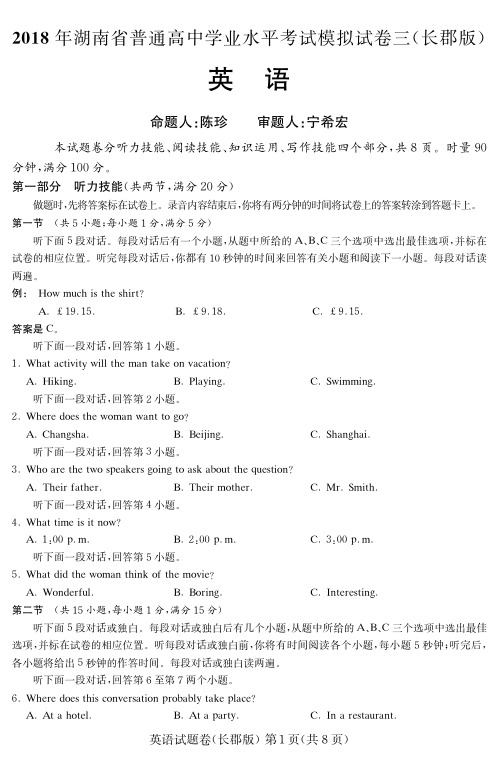
英语试题卷 长郡版第! 共 " 页 页
N 6 * + ,9 = 4 + < 4/ + 4, 1 3 0 3 0 49 = ;E E '6 O = 4 6 ( 6 H , + 6 )6 H 0 5 4 4 6 回答第"至第! $三个小题 听下面一段对话 " 68 0 + -B + 4 2 3 0 49 =, 9 = 3 3 + 3 9 < >, 1 3 0 '6J 5 6 P 1 6 # 68 0 4 5 4 1 2Q 5 6 * . 9 = ? '6 L =0 1 2 + I I 1 / 4 6 ( 6 ' 3 0 1 2 0 + 4 6 )68 4B + = R 3 > = + ,6 ! $ 68 0 1 / 0= . F 4 5 1 2 . 2 4 I . < 3 + 3 0 49 = '6 & M % $ S ! D ! K 6 (6 & M % $ S D D K K 6 )6 & $ % $ S ! N ! ! 6 回答第! !至第! D三个小题 听下面一段对话 ! ! 68 0 4 5 4B 1 BA 9 5 9? + < 9 2 3 A . = B 9 ; '6 H + 2 / 0 + + < 6 ! % 6 * + ,B 1 BA 9 5 9? 4 3 3 0 4 5 4 '6 ( . 2 6 ;F '6 A 1 T 3 S I + . 5 6 ; ( 6 ( 1 > 4 6 ;F )6 O =I + + 3 6 ! D 6 * + ,9 = 3 5 4 4 2 B 1 B 3 0 4 < 9 = 3 1 =9 < < ; ;E (6 U 1 I 3 S = 1 = 4 6 ; 听下面一段对话 回答第 至第 三个小题 ! K ! M ! K 68 0 4 5 4B + 4 2 3 0 4, + 9 =, 9 = 3 3 +? + '6 ' =+ I I 1 / 4 6 ! & 68 0 4 5 4B 1 B 3 0 4, + 9 =? 4 3 + I I '6 ' 3 3 0 4E + 2 3 + I I 1 / 4 6 ( 6 ' 3 3 0 4E + < 1 / 4 2 3 9 3 1 + = 6 )6 ' 3 3 0 4 I 5 . 1 3 2 0 + 6 E ! M 68 0 9 3 B + 4 2 3 0 4, + 9 =0 9 : 4 3 +B += + , '68 9 1 3 I + 5J 9 5 >9 3 3 0 4 / 5 + 2 2 5 + 9 B 2 6 ( 68 9 < >9 0 4 9 B9 = B 3 . 5 =5 1 0 3 6 ? )68 9 < >9 < 1 3 3 < 4, 9 9 / > 6 ;F 回答第! N至% $题 听下面一段独白 ! N 6 * + ,+ I 3 4 = 1 2* 9 < < + , 4 4 =/ 4 < 4 F 5 9 3 4 B '6 O = / 49; 4 9 5 6 ! " 68 0 9 3 B 9 1 2* 9 < < + , 4 4 = ; '6 Q 4 / 4 F 4 5 D ! 2 3 6 (6 W + : 4 F 4 5 ! 2 3 6 )6 O / 3 + F 4 5 D ! 2 3 6 ! # 68 0 1 BE 4 + < 4B 5 4 2 2 2 3 5 9 = 4 < =* 9 < < + , 4 4 = ;B E ? ;+ '6 H 0 4 9 = 3 4 B 3 +0 9 : 4 I . = 6 ;, ( 6 H 0 4 9 = 3 4 B 3 + I 5 1 0 3 4 =9 , 9 2 1 5 1 3 2 6 ;, ? ; E )6 H 0 4 9 = 3 4 B 3 + I 5 1 0 3 4 = 3 0 4 1 5= 4 1 0 F + 5 2 6 ;, ? ? % $ 6 * + ,B 1 BE 4 + < 49 / 3 + =* 9 < < + , 4 4 = E '6 H 0 4 / 3 4 B, 1 < B 6 ;9 ( 6 H 0 4 1 B 1 = 3 0 4 1 50 + . 2 4 2 6 ;0 )6 H 0 4 9 = B 4 B+ . 3 1 I 3 2 6 ;0 ? ( 6J + = 3 0 < 6 ; )6 V : 4 5 3 0 4 5 4 9 5 6 ;+ ; (6 'I 5 . 1 3 2 0 + 6 E )6 'E + < 1 / 4 2 3 9 3 1 + = 6 )6 U 1 I 3 S I 1 : 4 6 ; ( 6 H +9 I 9 5 -6 )6 H +9E 9 5 > 6 ( 6 P . / 6 ; )6 Q 5 6 * . 9 = 6 ?
湖南省邵阳市2018年普通高中学业水平模拟考试英语试题(五)(附答案)
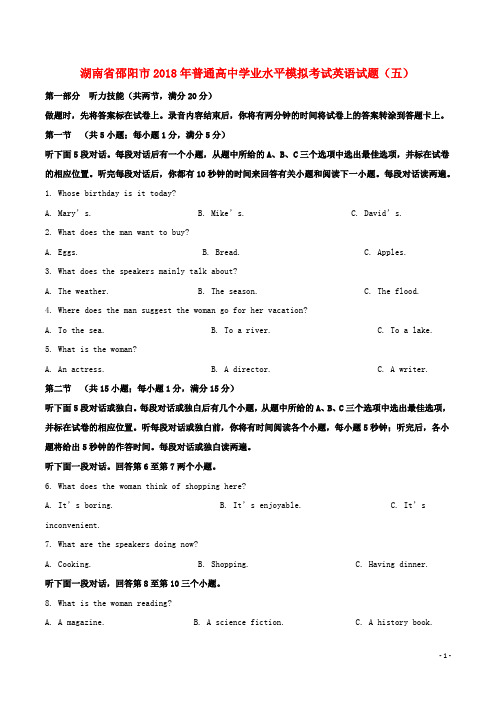
湖南省邵阳市2018年普通高中学业水平模拟考试英语试题(五)第一部分听力技能(共两节,满分20分)做题时,先将答案标在试卷上。
录音内容结束后,你将有两分钟的时间将试卷上的答案转涂到答题卡上。
第一节(共5小题;每小题1分,满分5分)听下面5段对话。
每段对话后有一个小题,从题中所给的A、B、C三个选項中选出最佳选项,并标在试卷的相应位置。
听完每段对话后,你都有10秒钟的时间来回答有关小题和阅读下一小题。
每段对话读两遍。
1. Whose birthday is it today?A. Mary’s.B. Mike’s.C. David’s.2. What does the man want to buy?A. Eggs.B. Bread.C. Apples.3. What does the speakers mainly talk about?A. The weather.B. The season.C. The flood.4. Where does the man suggest the woman go for her vacation?A. To the sea.B. To a river.C. To a lake.5. What is the woman?A. An actress.B. A director.C. A writer.第二节(共15小题;每小题1分,满分15分)听下面5段对话或独白。
每段对话或独白后有几个小题,从题中所给的A、B、C三个选项中选出最佳选项,并标在试卷的相应位置。
听每段对话或独白前,你将有时间阅读各个小题,每小题5秒钟;听完后,各小题将给出5秒钟的作答时间。
每段对话或独白读两遍。
听下面一段对话。
回答第6至第7两个小题。
6. What does the woman think of shopping here?A. It’s boring.B. It’s enjoyable.C. It’s inconvenient.7. What are the speakers doing now?A. Cooking.B. Shopping.C. Having dinner.听下面一段对话,回答第8至第10三个小题。
- 1、下载文档前请自行甄别文档内容的完整性,平台不提供额外的编辑、内容补充、找答案等附加服务。
- 2、"仅部分预览"的文档,不可在线预览部分如存在完整性等问题,可反馈申请退款(可完整预览的文档不适用该条件!)。
- 3、如文档侵犯您的权益,请联系客服反馈,我们会尽快为您处理(人工客服工作时间:9:00-18:30)。
2014年湖南省普通高中学业水平考试英语试卷(真题)本试卷分听力技能、知识运用、阅读技能、写作技能四个部分,共7页。
时量120 分钟,满分100分。
第一部分听力技能(共两节。
满分20分)做听力技能时,请先在试卷上作答。
听力技能结束前,你将有两分钟的时间将第1至16小题的答案转涂到答题卡上。
将第17至20小题的答案转写到答题卡上。
第一节听力理解(共16小题;每小题1分,满分16分)听下面9段对话,每段对话后有一个或一个以上小题,从题中所给的A. B. C 选项中选出最佳选项,并标在试卷的相应位置。
听每段对话前,你将有时间阅读各个小题。
每小题5秒钟;听完后将给出5秒钟的作答时间。
每段对话读两遍。
例听下面一段对话,回答第1小题。
I. How much is the shirt?A £ 19.13.B £9.18. C. £ 9.15答案是C。
1. What makes Tim upset?A. The chemistry test.B. The physics test.C. The maths test.听下面一段对话,回答第2小题/2. Where is the man going?A. To the teacher’s office.B. To the bus stop.C. To the hotel.听下面一段对话,回答第3小题。
3. Whom will the man buy a T-shirt for?A. His mother.B. His father.C. His brother.听下面一段对话,回答第4小题。
4. How many children are there in Ann’s family?A. One.B. Two.C. Three.听下面一段对话,回答第5小题。
5. When will the two speakers meet?A. At 9.30 a.m.B. At 9.00 a.m.C. At 8.30 a.m.听下面一段对话,回答第6至第7两个小题。
6. What is the weather like tomorrow?A. Foggy.B. Windy.C. Sunny.7. How does the woman know the weather?A. By watching TV.B. By listening to the radio.C. By reading newspapers. 听下面一段对话,回答第8至第10三个小题。
8. Which country is the new student from?A . America. B. China. C. Italy.9. What’s the relationship between the two speakers?A. Workmates.B. Strangers.C. Classmates.10. Who wants to go to China?A. The boy.B. The girl.C. The new student.听下面一段对话,回答第11至第13三个小题。
11. Which subject does the woman want to improve?A. Her English.B. Her Spanish.C. Her French12. Who gives the woman the advice?A. Mr Green.B. Mr Black.C. Mr Jackson.13. What does the man suggest the woman getting?A. AoMP4B. A mobile phone.C. A dictionary.听下面一段对话,回答第14至第16三个小题。
14. Why can’t Lin Lin go to Nan Nan’s birthday party?A. Because she is too busy.B. Because she doesn’t like parties.C. Because her parents don’t allow her to.15. Who usually buys the clothes for Lin Lin?A. Her mother.B. Her father.C. Her sister.16. What can Lin Lin do with her friends on Sunday nights?A. Buy new clothes.B. Play sports.C. See movies.第二节笔录要点(共4小题;每小题1分,满分4分)听下面一段材料,将第17至20小题的信息补充完整,每小题不超过三个单词。
听材料前,你将有时间阅读各小题,每小题5秒钟;听完后,各小题将给出 15秒钟的作答肘间。
本段材料读两遍。
第一节单项填空(共10小题;每小题1分,满分10分)从A、B、C、D选项中,选出可以填入空白处的最佳选项,并在答题卡上将该项涂黑。
例 It is generally considered unwise to give a child he or she wants.A. howeverB. whateverC. whicheverD. whenever 答案是B。
21. I often go to the school library with friends at weekends.A. myB. mineC. meD. I22. Smoking kills, so you stop smoking.A. mayB. canC. mustD. dare23. We have not given up the search for the missing plane MH370, ?A. don’t weB. haven’t weC. do weD. have we24. This is the city Daniel visited last summer vacation.A. whoB. whichC. whomD. whose25. ______ is reported that the No.2 Underground in Changsha is now in use.A. ItB. ThatC. ThisD. There26. Sarah wants to know she has passed the exam or not.A. whyB. howC. whetherD. what27. Travelling a good way to learn about the world.A. isB. areC. haveD. has28. The 31st Summer Olympic Games _____ in Brazil in 2016.A. have heldB. heldC. are heldD. will be held29. Both Jeff and Joan have been learning Chinese they came to China in 2013.A. whileB. sinceC. untilD. before30. You can ask your teachers you when you have trouble.A. helpsB. helpedC. to helpD. helping第二节完形填空(共10小题;每小题1分,满分10分)阅读T面短文,掌握其大意,然后从第31至第40小题所给的A、B、C、D 选项中,选出最佳选项,并在答题卡上将该项涂黑。
Have you ever heard the radio club in our school? It is great because it is run by the students for the school. Kate Jones is 31 as she is one of the hosts. It was 32 two years ago. One day, Kate just began thinking about 33 for everyone, so she asked the headmaster if music could be played during break times. He agreed to the 34 , and two years later Kate is in charge of the radio club 35 the oldest student member. The club is much more than music. Every morning the hosts 36 their schoolmates about the weather, recent news, and some special messages that they are required to broadcast.When parents come to visit the school and talk to the teachers, Kate and her fellows 37 play songs sung by students, and also give messages to inform the 38 of events such as outings and school plays. At the end of the school year, many students who are graduating use the 39 to give messages to their close friends and teachers.Kate says she will miss the radio club after graduation, 40 she knows that it will continue without her.31. A. afraid B. shy C. lucky D. angry32. A. started B. made C. found D. ended33. A. paintings B. sport C. stories D. music34. A. order B. question C. idea D. speech35. A. to B. about C. as D. from36. A. tell B. warn C. call D. ask37. A. never B. often C. seldom D. hardly38. A. foreigners B. reporters C. friends D. parents39. A. club B. party C. team D. class40. A. thus B. but C. or D. so第三部分阅读技能(共三节,满分35分)第一节阅读理解(共12小题;每小题2分,满分24分)阅读下列短文,从每题所给的A、B、C、D选项中,选出最佳选项,并在答题卡上将该项涂黑。
